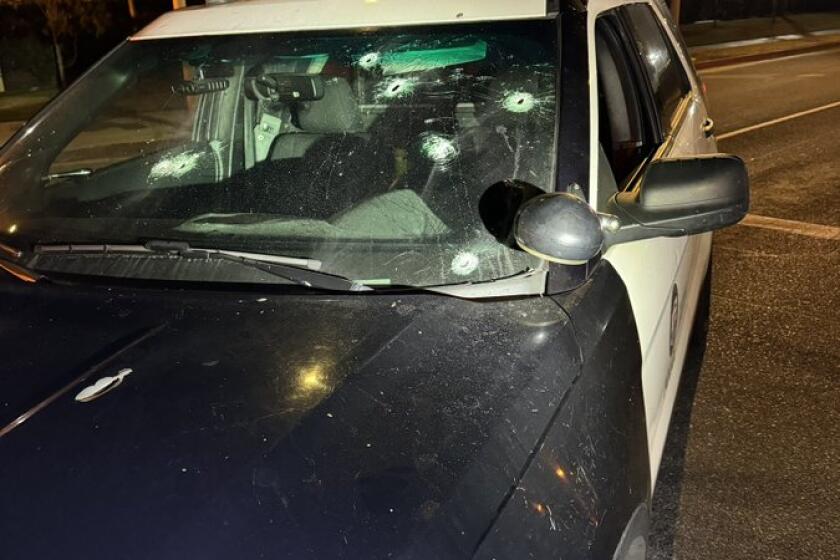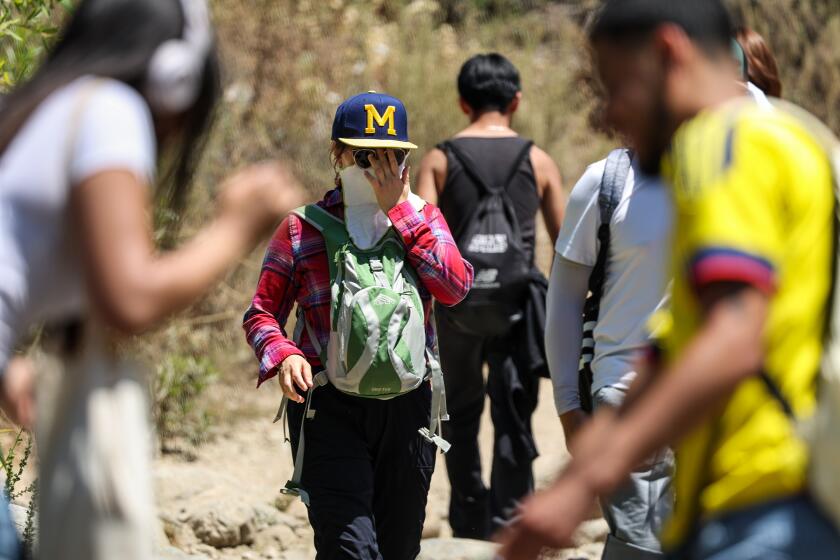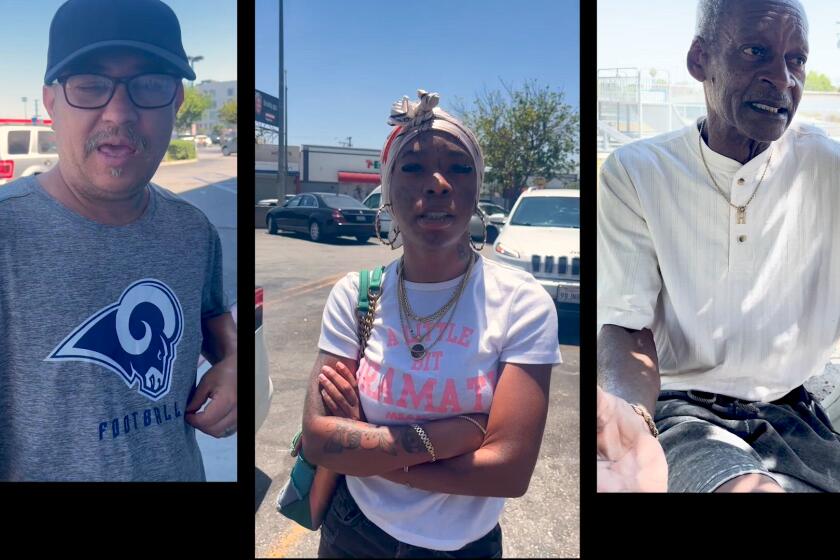6 Deputies Guilty in Corruption Case : Narcotics: Members of elite team convicted of conspiring to steal cash from traffickers, money launderers. Hundreds of thousands of dollars involved.
Six Los Angeles County sheriff’s deputies were convicted Monday of conspiring to steal cash seized from drug traffickers and money launderers, the first prosecutorial victory in a widening corruption investigation that has touched dozens of narcotics officers.
The veteran deputies, who worked on an elite team investigating major drug cases, were found guilty by a federal court jury of 24 criminal charges, including conspiracy, theft, money-laundering, racketeering and tax evasion.
The federal and local investigation that led to their convictions has already resulted in the dismantling of anti-drug squads in the Sheriff’s Department, the transfer of dozens of narcotics officers and allegations of similar conduct by several members of the Los Angeles Police Department.
Nearly two-dozen criminal cases have been dismissed, plea bargained or are under review as a result of the corruption scandal, one of the worst in the region’s law enforcement history.
“The verdicts handed down today are not an occasion to celebrate, they are not a victory,” Sheriff Sherman Block said in a statement released Monday. “They are the just conclusion to the unlawful actions of a few who sought to hide their crimes behind a badge of honor.”
The jury also convicted a seventh officer on one count of circumventing bank reporting requirements to conceal large cash deposits, while acquitting three of the deputies on a charge that they stole more than $500,000 in a single raid.
Facing prison terms of as long as 53 years, the deputies are scheduled to be sentenced in January and February.
The deputies remained emotionless as U.S. District Judge Edward Rafeedie read the unanimous verdicts and then declared a mistrial on 26 additional charges on which the jury was deadlocked. As the defendants walked from the federal courtroom in downtown Los Angeles, they appeared stunned.
“I’m disappointed with the verdict,” said Deputy James R. Bauder. “I’m sure the jury did the best job they could, but we’re disappointed.”
Attorneys for some of the deputies said their clients would have no immediate comment because of a gag order imposed earlier in the trial.
“I’m just floored by the conviction of (Terrell H.) Terry Amers,” said his defense attorney, Paul R. DePasquale, “and I have no further comment.”
In addition to Bauder and Amers, the other convicted deputies were Ronald E. Daub, Eufrasio G. Cortez, John C. Dickenson, Macario M. Duran and Daniel M. Garner. All except Duran had worked together on the same drug investigation team for the Sheriff’s Department. Only Duran was not convicted of conspiracy.
Although the prosecution alleged that the deputies stole more than $1.4 million during drug raids in 1988 and 1989, the jury found six guilty of skimming only $48,000--the amount taken during a video-taped FBI sting operation.
“I think the verdicts speak for themselves. It is our position . . . that jury’s verdicts reflect that the jury accepted the allegations in the indictment that there was corruption in Majors II,” said Assistant U.S. Atty. Jeffrey C. Eglash, one of the co-prosecutors in the case.
Eglash was referring to one of four major narcotics teams that operated within the Sheriff’s Department, investigating Los Angeles County’s biggest drug dealers and money launderers. All four teams are now disbanded.
The convicted men included some of the department’s most decorated and experienced deputies. Among the defendants were a valor medal-winner who was wounded in a vain attempt to save his partner; a deputy who was the recipient of the California narcotics Officer of the Year award, and a second-generation deputy whose father served in the Sheriff’s Department.
Some jurors said it was disturbing to see law enforcement officers turn to corruption, using stolen money to buy such luxuries as cars, boats, jewelry and vacation homes. After the seven-week trial they convicted:
* Cortez, 39, on six counts including conspiracy, theft, tax evasion and money-laundering. A 15-year department veteran, Cortez was once honored by the California Narcotics Officers Assn. as a top drug officer in the state. He faces 53 years in prison.
* Daub, 39, on six counts of conspiracy, theft, tax evasion and structuring financial transactions to evade bank reporting requirements. A 17-year department veteran, he faces 48 years in prison.
* Garner, 44, for three counts of conspiracy, theft and tax evasion. Hired in 1971, he faces 18 years in prison.
* Bauder, 32, for conspiracy, theft and tax evasion. A 10-year department veteran and second-generation sheriff’s deputy, Bauder’s father had retired as a lieutenant in the narcotics bureau. He faces 18 years in prison.
* Amers, 47, for conspiracy, theft and tax evasion. With 23 years of service, Amers was the most experienced of the deputies. He faces 18 years in prison.
* Dickenson, 32, for conspiracy and theft. An 11-year veteran, Dickenson won the Medal of Valor in 1988 for attempting to save his mortally wounded partner during a shoot-out with a drug suspect. He faces 15 years in prison.
* Duran, 44, for a single count of structuring currency transactions to evade bank reporting requirements. While prosecutors claimed he was hiding stolen drug money, Duran said he and his wife had actually skimmed money from her beauty shop and had failed to report it to the Internal Revenue Service.
Duran faces a five-year prison term. The jury could not reach a verdict on whether the 14-year department veteran had conspired with the others to steal money during drug raids.
With the exception of Duran, all the deputies were convicted of a single theft charge stemming from the FBI’s undercover investigation.
During the trial, prosecutors played a videotape of the sting, showing Bauder and Garner entering the Sherman Oaks hotel room of an FBI agent, who was posing as a money launderer, and taking bundles of cash from a bag.
Two days later, hundreds of federal and local agents, armed with warrants, raided the deputies’ homes and offices. Authorities discovered marked bills from the sting at the houses of four deputies.
In interviews at the courthouse, jurors said they considered the videotape damning evidence against the deputies. Also crucial, according to the jurors, was a tape recording secretly made of the deputies by the government’s chief witness--former Sheriff’s Sgt. Robert R. Sobel, who cooperated in exchange for a reduced sentence.
All but one of the indicted deputies were working for Sobel.
In agreeing to testify, Sobel was allowed to plead guilty to single counts of conspiracy and filing a false tax return. Prosecutors also dropped five theft charges against him and shaved his maximum prison sentence from 58 years to 8. He is awaiting sentencing.
As the key witness against the deputies, the 45-year-old Sobel spent three days detailing how he and his crew skimmed money, beat drug suspects and then lied in official reports to cover up the misconduct.
Throughout the trial, defense attorneys and their clients had sought to portray Sobel as an admitted liar and thief--traits, they said, he had long before he joined the defendants as their supervisor.
Jurors said Sobel’s testimony was not crucial to reaching their verdicts.
In addition to the tapes, the prosecution presented 155 witnesses and more than 1,000 pieces of evidence, including the defendants’ financial records in an attempt to link the stolen drug money to a torrent of cash purchases.
Prosecutors took jurors painstakingly through bank records, sales receipts, escrow papers and detailed charts to show that the deputies were spending far more than the income they reported on tax returns.
Immediately after the verdicts were read, Rafeedie set separate sentencing dates for each beginning next month. All remain free on bail, despite prosecution attempts to have Bauder, Garner and Cortez jailed. They were described as likely to flee, a contention rejected by the judge.
The closely watched trial was the first of three scheduled in federal court for defendants linked to the money-skimming scandal. Two other narcotics deputies--Nancy A. Brown and Michael J. Kaliterna--are slated to stand trial early next year. Another trial involving Duran, his wife and his mother-in-law is scheduled to begin in February, attorneys said. Although Brown and Kaliterna were indicted with the other officers, their trials were severed because of alleged problems with warrants used to search their homes and cars, where prosecutors say money linked to the sting was recovered.
Kaliterna’s attorney said it was unlikely that the convicted deputies would strike a deal with the prosecution and testify against his client.
“Throughout the trial they have been pressured to cooperate and they have resisted because they were innocent,” attorney Leonard Levine said. “I don’t think their feelings are going to change any because of the verdict.”
A federal grand jury, meanwhile, has been investigating other sheriff’s deputies and several LAPD narcotics officers as part of the continuing money-skimming probe. They allegedly engaged in thefts, beatings and the planting of drugs on suspects during raids.
Prosecutors, defense attorneys and officers still under investigation had awaited Monday’s verdict as a test of whether any jury would convict veteran officers with exemplary records who staunchly proclaimed their innocence.
During the trial, prosecutors contended that the deputies, despite their seemingly unblemished backgrounds, routinely stole money from drug dealers and money launderers while detaining them during narcotics raids.
According to prosecutors, the deputies would stop a money courier or drug trafficker and ask the suspect to sign a disclaimer waiving any ownership of the money. Then, they would steal some of the cash before placing it in the evidence room at the Sheriff’s Department’s narcotics headquarters in Whittier.
In one instance, Cortez, Garner and Amers were accused of stealing $527,000 during a 1988 raid. But they were acquitted on that charge by jurors who said they found it difficult to believe the testimony of the drug dealer who was allegedly victimized by the theft.
Prosecutors said they have not yet decided whether to retry the deputies on the charges on which the jury deadlocked.
INVESTIGATION CHRONOLOGY
Key events in the investigation of money-skimming by some narcotics officers in the Los Angeles County Sheriff’s Department:
October, 1988--The Sheriff’s Department begins an internal investigation after receiving an anonymous letter from a deputy’s wife alleging that narcotics officers are stealing drug money confiscated from money-launderers and drug dealers.
Aug. 30, 1989--Federal agents videotape a 12-hour sting at a Sherman Oaks hotel targeting the nine members of the elite “Majors II” narcotics squad. One squad member is captured on the tape hurriedly taking three $10,000 bundles of cash from a suspected drug dealer’s satchel and stuffing them into a fellow deputy’s bag.
Sept. 1, 1989--Hundreds of FBI agents and sheriff’s deputies raid the homes and offices of Majors II squad members, finding sting money in the homes of three deputies and in a fourth deputy’s car. The eight veteran officers and their sergeant are suspended in what Sheriff Sherman Block says is the worst corruption scandal to rock the department in decades.
Sept. 20, 1989--The Sheriff’s Department disbands its four elite narcotics squads, transferring at least 30 officers from the narcotics bureau headquarters in Whittier to stations throughout the county.
Oct. 3, 1989--Nine more narcotics officers are suspended, bringing to 18 the number of deputies relieved of duty.
Feb. 22, 1990--A federal grand jury indicts 10 Los Angeles County Sheriff’s narcotics officers, accusing them of stealing more than $1.4 million in seized drug cash and using much of the money to buy things such as boats, vacation homes and stocks. The veteran officers are also accused of conspiracy and various money-laundering and tax-evasion charges.
Feb. 23, 1990--The attorney representing Sgt. Robert R. Sobel announces that his client has reached a plea bargain with federal prosecutors and will testify against his former narcotics team.
April 18, 1990--The investigation of alleged misconduct within the Sheriff’s Department continues as officials announce that eight more narcotics officers have been relieved of duty. This brings to a total of 26 the number of deputies suspended as a result of the ongoing probe.
Aug. 6, 1990--U.S. District Judge Edward Rafeedie rules that evidence obtained in search warrants against two indicted deputies, Nancy A. Brown and Michael J. Kaliterna, cannot be used in court. Their trials are later severed from those of their fellow officers.
Oct. 9, 1990--Trial of seven sheriff’s deputies begins.
Dec. 10, 1990--Six deputies are convicted of conspiring to steal drug money. A seventh is found guilty of tax violations.
More to Read
Start your day right
Sign up for Essential California for news, features and recommendations from the L.A. Times and beyond in your inbox six days a week.
You may occasionally receive promotional content from the Los Angeles Times.





